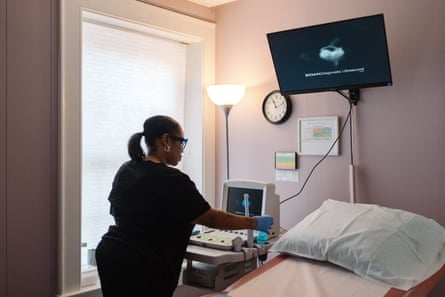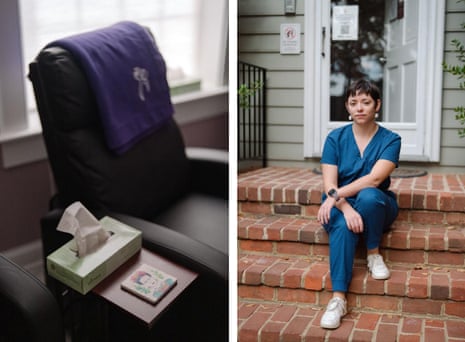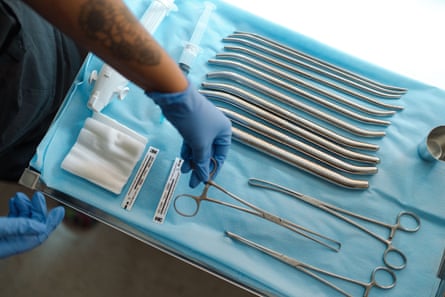By the time Chasity Dunans learned about her pregnancy, she had already lost the right to end it.
She had gotten her period in July, but towards the end of the month the 23-year-old mother of one started to have heartburn and wrenching stomach pains. She told herself: you’re not pregnant, you’re just sick. When the pain didn’t stop, she gave in and saw a doctor.
“He was like, ‘Oh, yeah, you’re six, seven weeks pregnant,’” Dunans recalled. Then, she says, he added: “I don’t know what your guys’ plans are, but I do have to let you know that in Georgia, [if it’s] six weeks with a heartbeat, you cannot terminate the pregnancy here.”
In the year since the supreme court overturned Roe v Wade, nearly all states in the US south, including Georgia, have banned almost all abortions. Only one southern state has not restricted abortion: Virginia.
That’s why, on a recent Tuesday in October, Dunans and her boyfriend, Jayvonta Stone, drove eight hours from their home in Georgia to a house on a sleepy street in Charlottesville, Virginia. Other than the small sign out front and a couple of quiet protesters who lingered on the sidewalk, there was little to suggest that the house was home to an outpost of a national network of abortion clinics, Whole Woman’s Health.
There, after waiting all day, Dunans was finally able to get an abortion, exactly 14 weeks into her pregnancy.
“There are situations where some people are not ready, and why is it fair to bring a child into that situation? Some people, in the moment, have sex, and boom: ‘Oh, no, we’re pregnant,’” Dunans said, as she sipped tea a few minutes after her procedure. “That doesn’t mean it’s planned, doesn’t mean it’s wanted. It’s unexpected. So you should have that choice to determine how your life should go, especially if you cannot handle a child.”

Virginia’s status as a haven of southern abortion access is at risk. On 7 November, the state will hold elections for the state legislature. Republicans, who already hold a majority in the house of delegates, need to win only a handful of seats to take control of the senate.
Abortion is at the center of the election. Not only is it one of the top issues for voters, according to multiple polls, but Virginia’s governor, the Republican Glenn Youngkin, has made his support for a 15-week ban the centerpiece of his campaign to help Republicans retake the state legislature.
Democrats and Republicans have spent the last decade trading control of both chambers of Virginia’s state legislature and the governor’s mansion, with Democrats winning all three in 2019 only to lose the house of delegates and the governorship just two years later. The November elections are set to be extremely close: a mid-October poll found that 42% of voters plan to support the local Democratic candidate, while 41% will support the Republican.
If such a ban were to take effect in Virginia, many abortion clinics outside the state would likely feel the effects. In the year after Roe’s demise, the rate of abortions in Virginia surged. Clinics in the state performed, on average, roughly 550 more abortions each month compared with the months before Roe disintegrated, according to research from the Society of Family Planning. An abortion ban could force many of those patients to flee even farther north, to clinics that are already overwhelmed.
Republican proponents of a 15-week ban argue that it’s a reasonable compromise on a contentious issue – the vast majority of US abortions take place in the first trimester of pregnancy. But abortion providers and their allies say they are increasingly seeing patients later on in pregnancy, due to the cascade of post-Roe restrictions that make it harder to get abortions quickly. People with low incomes, people of color and minors all are more likely to get abortions later in pregnancy.

‘I think it’s cruel’
A 20-year-old woman who got an abortion at Whole Woman’s Health the same day as Dunans said that, although an abortion fund helped cover half the cost of her abortion, she and her partner struggled to pool the remaining $700.
“I’m still at home and don’t feel like I could give the child the best life right now,” she said. The woman, who asked to speak anonymously, wants to go to college and get a real estate license.
“I would always say if I did something stupid, I would have a baby, but now I’m at the point where I did something stupid,” the woman said, as she snacked on chocolate pudding and a Slim Jim while waiting for the procedure. “Well, not stupid. I had sex and I got pregnant.”
The woman, who said she has identified as “pro-choice” all her life, wants to move out of her conservative hometown in Virginia, especially if the state restricts abortion. Right now, she can’t afford to leave.
After Dunans and Stone discovered Dunans was pregnant, the couple took a few weeks to decide what to do. Having been together since they met on the school bus seven years ago, they are already parents to a one-year-old. They want to have a second child one day, but decided they just can’t afford another right now. Stone does maintenance; Dunans raises their child.
“I don’t think I would be able to stay afloat with two children at this time,” Dunans said. Becoming a parent is exhausting, she continued: “It’s mentally draining. It’s emotionally draining. It’s physically draining. And there’s a lot of people who don’t have that strength to do so. So I’m always pro-choice. Your body, your choice.”
Since Georgia bans abortion past roughly six weeks of pregnancy, Dunans booked an appointment at an abortion clinic in North Carolina for the first week of October. The drive took five hours and cost $80 in gas. Once she and Stone arrived, they learned Dunans was past 12 weeks of pregnancy. Due to a law enacted on 1 July, North Carolina clinics can’t perform abortions after that point.

“My jaw dropped,” Dunans said. “We don’t have the luxury of wasting money like that, not in this time in our lives. So every penny counts. And to get that information – it was crushing.”
After the 12-week ban took effect in North Carolina, abortions in the state plunged by more than 30%, according to recent research by the Guttmacher Institute, which tracks abortion restrictions.
On the day Dunans and Stone visited Whole Woman’s Health, about a week after their trip to North Carolina, 18 people showed up for abortions. At least two patients came from North Carolina – two from Georgia and one from West Virginia, according to a doctor who performed abortions that day.
after newsletter promotion
Due to the volume of patients that day, the doctors worked late into the evening, well past the clinic’s normal closing time. Because many patients had brought loved ones – their boyfriends, their mothers – to the appointment, the clinic was a full house. People waited in a converted living room, complete with fireplace and brochures for birth control, and listened to a soundtrack of relaxing muzak, waves and birdsong as doctors bustled around upstairs.
Almost everybody was dressed for comfort, with many in sweats and Crocs. Few people spoke; several couples held hands and cuddled. One man appeared to fall asleep as he and his partner waited for her turn.
The clinic’s purple walls were peppered with quotes from famous women and inspirational posters. “You got this,” one read. “Be your own hero,” another declared. One wall in a back room featured a quote attributed to Heather Heyer, the woman killed in the infamous 2017 Unite the Right rally in Charlottesville. “If you are not outraged, you are not paying attention,” it read.

Amy Hagstrom Miller, the CEO of Whole Woman’s Health, bought the clinic in 2017 from a retiring abortion provider, whose version of security was a back door that played the song Jingle Bells whenever someone walked in. Now, a receptionist keeps an eye on several cameras pointed at the clinic’s exterior – one of the few visible reminders that abortion, and the people who provide it, are under threat. A list of anti-abortion extremists, including their pictures, hangs in a back hallway, away from patients’ eyes.
Currently, the clinic performs abortions up until 16 weeks of pregnancy. Hagstrom Miller wants to expand to 18 weeks by the end of the year and eventually go as late as 24 weeks.
“More and more people are being pushed into the second trimester because they’re being denied abortion in Alabama or in Georgia or South Carolina or West Virginia or Tennessee, and so they have to figure out how to travel to another state and get childcare and get time off work,” she said. “It just pushes them further into the pregnancy – not because they’re just like sitting around, saying, ‘Oh, I’m gonna wait until the second trimester ’cause that sounds like a better kind of abortion.’ I think it’s cruel.”
Avantae, who asked to be identified only by her first name, works as a patient advocate at Whole Woman’s Health, counseling patients as they navigate the process. She had an abortion when she was nearly 14 weeks into her pregnancy. She only realized she was pregnant at 13 weeks, when she was a single mother of one and, she said, “at a really unhealthy and low place”.
If she had been unable to get an abortion, Avantae is not sure if she would still be alive.
“Even the child that I had, who I love and adore, was not enough to keep me here,” Avantae said. “My abortion literally saved my life.”

Most abortion patients in the United States are in their 20s, have already given birth at least once before, and have low incomes. Avantae talks to patients who don’t have phones, cars or computers; they have to scramble to take time off work, find childcare and scrape together hundreds of dollars to pay for an abortion.
All of these problems can delay getting care.
“Fifteen weeks, from start to finish, is a seemingly good amount of time, but in the scope of pregnancy and making this type of decision, it’s not enough time,” Avantae said.
If Virginia outlaws abortion past 15 weeks or earlier, southern abortion seekers will likely stream into clinics closest to the Mason-Dixon line, in places like Maryland or Washington DC. Those clinics are already facing an increase in patients.
Hagstrom Miller, well aware that the coming election may torpedo her plans to expand the kinds of abortions her clinic offers, doesn’t trust that Republicans would stop at a 15-week ban. She’s not alone. A September poll from Data for Progress, a progressive polling firm, found that more than half of likely Virginia voters in competitive districts have little trust in Republicans when it comes to their positions on abortion and reproductive healthcare.
After all, the case that overturned Roe v Wade, Dobbs v Jackson Women’s Health Organization, technically turned on the constitutionality of a 15-week abortion ban in Mississippi. Since then, 16 states have banned almost all abortions.
“They start with a 15-week ban,” Hagstrom Miller said. “And then they push to a six-week ban, and then they push to a total ban.”
This article was amended on 31 October 2023 to correctly identify the lower chamber of Virginia’s legislature.
